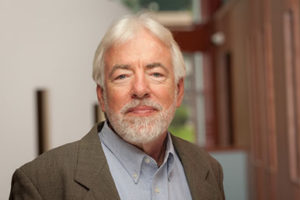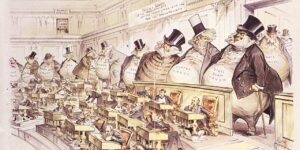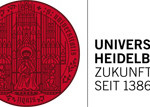There’s Much To Say About Economics Of War, But Most Economists Won’t Address It
No Comments yet
James K. Boyce – Photo by Matthew Cavanaugh
01-14-2025 ~ Traditional economics virtually ignores war, even though economic triggers directly contribute to conflicts.
“Economic policies have profound effects on the tensions within and between countries — tensions that can lead to war,” renowned progressive economist James K. Boyce remarked to me recently, adding that economics is in part “about plunder … and plunder sometimes morphs into war.”
Given that economic triggers clearly contribute to conflicts, why is war a topic largely neglected by the economics profession?
In the interview that follows, Boyce explains why war is ignored by most economists; dissects the link between economics and war, and more specifically capitalism’s relationship to war and conflict; and discusses the role that economics can play in peacebuilding.
James K. Boyce is professor emeritus of economics and senior fellow of the Political Economy Research Institute at the University of Massachusetts Amherst. He is the author of Investing in Peace: Aid and Conditionality after Civil Wars and editor of Peace and the Public Purse: Economic Policies for Postwar Statebuilding and Economic Policy for Building Peace: The Lessons of El Salvador. He received the 2024 Global Inequality Research Award and the 2017 Leontief Prize for Advancing the Frontiers of Economic Thought. This interview is based on his seven-part video series released by the Institute for New Economic Thinking in October 2024.
C. J. Polychroniou: War and peace are topics studied by scholars in the fields of political science and international affairs and largely ignored by economists. But in a series of lectures available from the Institute for New Economic Thinking, you argue that economic theory has a lot to offer. So, start by telling us how economics can help us analyze war and peace yet why mainstream economists think that war and peace are not an “economic” problem.
James K. Boyce: Let me start with the second part of your question: why, despite the long history of wars and their terrible consequences for human well-being and economies, this topic is neglected today by most economists.
One basic reason is that rather than starting from observed reality and then trying to make sense of it, orthodox economics starts from theory and then tries to squeeze reality into it. Whatever doesn’t fit is dismissed as “non-economic.” This is what I call the “shrug” response: War is somebody else’s problem.
The other response is to concede that economics may be relevant to the dynamics of war and peace, but then to claim the way to minimize violent conflict is to stick to business-as-usual policy prescriptions focused on efficiency and growth. This is what I call the “smug” response: Economics matters, but there is no need for rethinking.
The videos discuss why, in my view, these responses are inadequate and irresponsible. In truth, economic policies have profound effects on the tensions within and between countries — tensions that can lead to war. They also can affect the success of efforts to build a durable peace. Of course, economics is not the whole story. But neither is it wholly immaterial.
As to how economics can help us to analyze war and peace, one key point is that we must pay attention to not only the size of the economic pie but also how it is sliced. This includes not only vertical inequality, the distribution of wealth and income between rich and poor, as measured for example by the Gini coefficient, but also horizontal inequality, the distribution of wealth and income across lines of ethnicity, region, race and religion that often form the fault lines of conflict.
Carl von Clausewitz’s most famous saying is that war is the continuation of politics by other means. According to his thinking, war occurs as states pursue goals that clash with the goals of other states. What else can economics tell us about why wars occur?
One could also say that politics is the continuation of economics by other means. This is evident once we realize that economics involves more than the textbook fantasy world of perfectly competitive markets with perfectly defined property rights. Economics is also about plunder, the seizure of resources and the control of market choke points. And plunder sometimes morphs into war.
In neoclassical economic theory, plunder is ruled out by assumption: The theory begins an initial distribution of “endowments,” in effect, property rights that fall from the sky. This distribution, together with preferences and technology (likewise typically taken to be exogenous) determines what will be produced and who will consume it. In the real world, however, people devote a lot of time and effort to battles over the control of property, as any lawyer will tell you.
In Marxian economic theory, plunder is seen as having played a crucial role during the “rosy dawn of primitive accumulation” before the industrial era, when fortunes were acquired by theft, enslavement and expropriation. But during the 19th century the engine of wealth accumulation shifted to the appropriation of the surplus value produced by wage labor, and the main axis of conflict became the struggle over the division of output between capital and labor. Yet in practice, conflicts over land, minerals, and other forms of property remain a common feature of economic life even in the advanced industrialized economies, and these conflicts are ubiquitous in many former colonies like the Democratic Republic of the Congo.
In addition to struggles over control of resources, we also see constant struggles over control of markets. Monopolies and oligopolies yield profits well above what would prevail in a textbook world of perfect competition. Choke points are especially lucrative in markets for essential commodities like oil and minerals and in key technologies like software and semiconductors.
Both sorts of plunder — via appropriation of resources and control of markets — are ruled out as long as economic theory is based only on free exchanges among consenting adults. Instead, they involve the coercive power of the state, the manipulation and subversion of legal frameworks, and chicanery as well as outright theft. In the words of Woody Guthrie, the great American folksinger, “Some rob you with a six-gun, and some with a fountain pen.”
Greed is often seen as a cause of war in modern times. But is it because people are greedy or because they are capitalist that conflict and wars occur? Aren’t capitalism and war linked?
Well, yes. Economies and wars are linked, and most people live today in capitalist economies. But wars happened long before capitalism, and it would be naïve to assume that without it wars would disappear. Capitalism is distinctive, however, in that its ideological cheerleaders sometimes extoll greed as a positive virtue. It is hard to imagine the phrase “greed is good” gaining moral traction in other societies. But even under capitalism, calling a person greedy typically is not meant as a compliment.
One of the videos in the series describes a research project on the economics of violent conflict that was launched in the late 1990s by the World Bank. The project aimed to assess the respective roles of greed and grievance as drivers of civil war. Opportunities for the plunder of natural resources were found to be a strong predictor of conflict, and this was seen as evidence that greed is a key cause of war.
Grievance, for which vertical income inequality was taken as a proxy variable, was initially found to be relatively unimportant. But this was partly due to how inequality was conceptualized. For understanding the roots of war, we must look at not only vertical inequality — overall gaps between rich and poor — but also horizontal inequality.
Greed and grievance can feed each other. The greedy behavior of kleptocrats, oligarchs and their cronies leads to grievances among the public, and these provide fertile ground for the rise of rebel leaders who then pursue their own opportunistic, greed-driven agendas. Both greed and grievance are important in the dismal science of war.
What role can economics play in peacebuilding, and what do you see as the main obstacles to investing in peace?
In war-torn societies, economic recovery is crucial in building a durable peace. The prospect of a “peace dividend” — economic benefits after the cessation of hostilities — often serves as an important incentive for warring parties to come to a negotiated settlement that falls short of their ultimate political objectives.
That said, it is not enough simply to rebuild infrastructure and reboot growth. How the economic fruits of recovery are distributed within and between the opposing sides also matters greatly. For external assistance to contribute effectively to peacebuilding, other choices matter greatly, too: whether the aid helps to build a legitimate and effective state or instead has the effect of undermining statebuilding; whether goods and services needed for projects are procured locally or imported from overseas; and what formal and informal conditions are attached to the provision of aid. I discuss these in the videos.
In the last episode, I identify four important obstacles to investing in peace. One is that the commercial and geopolitical aims of aid donors do not necessarily align with the needs of peacebuilding. Second, the internal incentive structures of aid agencies, where the emphasis is on “approval and disbursement,” impedes the careful calibration of aid disbursements as a carrot to advance the peace process. A third obstacle lies in the ideological biases of policymakers, especially economists, who focus on “efficiency” — defined simplistically as a larger economic pie — to the exclusion of other considerations, including how the pie is sliced. The final obstacle is that aid recipients sometimes object to peace conditionality, claiming that it infringes on “national sovereignty,” as if aid otherwise would not have political impacts. These obstacles are not insuperable, but the first step in dealing with them is to face them squarely.
This article is licensed under Creative Commons (CC BY-NC-ND 4.0), and you are free to share and republish under the terms of the license.
C.J. Polychroniou is a political scientist/political economist, author and journalist who has taught and worked in numerous universities and research centers in Europe and the United States. Currently, his main research interests are in U.S. politics and the political economy of the United States, European economic integration, globalization, climate change and environmental economics, and the deconstruction of neoliberalism’s politico-economic project. He is a columnist for Global Policy Journal and a regular contributor to Truthout. He has published scores of books, including Marxist Perspectives on Imperialism: A Theoretical Analysis; Perspectives and Issues in International Political Economy (ed.); and Socialism: Crisis and Renewal (ed.), and over 1,000 articles which have appeared in a variety of journals, magazines, newspapers and popular news websites. Many of his publications have been translated into a multitude of languages, including Arabic, Chinese, Croatian, Dutch, French, German, Greek, Italian, Japanese, Portuguese, Russian, Spanish and Turkish. His latest books are Climate Crisis and the Global Green New Deal: The Political Economy of Saving the Planet (with Noam Chomsky and Robert Pollin as primary authors, 2020); The Precipice: Neoliberalism, the Pandemic, and the Urgent Need for Radical Change (an anthology of interviews with Noam Chomsky, 2021); Economics and the Left: Interviews with Progressive Economists (2021); Illegitimate Authority: Facing the Challenges of Our Time (an anthology of interviews with Noam Chomsky, 2023); and A Livable Future Is Possible: Confronting the Threats to Our Survival (an anthology of interviews with Noam Chomsky, 2024).
You May Also Like
Comments
Leave a Reply








